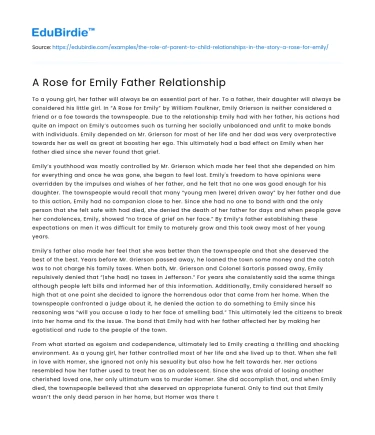To a young girl, her father will always be an essential part of her. To a father, their daughter will always be considered his little girl. In “A Rose for Emily” by William Faulkner, Emily Grierson is neither considered a friend or a foe towards the townspeople. Due to the relationship Emily had with her father, his actions had quite an impact on Emily’s outcomes such as turning her socially unbalanced and unfit to make bonds with individuals. Emily depended on Mr. Grierson for most of her life and her dad was very overprotective towards her as well as great at boosting her ego. This ultimately had a bad effect on Emily when her father died since she never found that grief.
Emily’s youthhood was mostly controlled by Mr. Grierson which made her feel that she depended on him for everything and once he was gone, she began to feel lost. Emily's freedom to have opinions were overridden by the impulses and wishes of her father, and he felt that no one was good enough for his daughter. The townspeople would recall that many “young men |were| driven away” by her father and due to this action, Emily had no companion close to her. Since she had no one to bond with and the only person that she felt safe with had died, she denied the death of her father for days and when people gave her condolences, Emily, showed “no trace of grief on her face.” By Emily’s father establishing these expectations on men it was difficult for Emily to maturely grow and this took away most of her young years.
Save your time!
We can take care of your essay
- Proper editing and formatting
- Free revision, title page, and bibliography
- Flexible prices and money-back guarantee
Emily’s father also made her feel that she was better than the townspeople and that she deserved the best of the best. Years before Mr. Grierson passed away, he loaned the town some money and the catch was to not charge his family taxes. When both, Mr. Grierson and Colonel Sartoris passed away, Emily repulsively denied that “|she had| no taxes in Jefferson.” For years she consistently said the same things although people left bills and informed her of this information. Additionally, Emily considered herself so high that at one point she decided to ignore the horrendous odor that came from her home. When the townspeople confronted a judge about it, he denied the action to do something to Emily since his reasoning was “will you accuse a lady to her face of smelling bad.” This ultimately led the citizens to break into her home and fix the issue. The bond that Emily had with her father affected her by making her egotistical and rude to the people of the town.
From what started as egoism and codependence, ultimately led to Emily creating a thrilling and shocking environment. As a young girl, her father controlled most of her life and she lived up to that. When she fell in love with Homer, she ignored not only his sexuality but also how he felt towards her. Her actions resembled how her father used to treat her as an adolescent. Since she was afraid of losing another cherished loved one, her only ultimatum was to murder Homer. She did accomplish that, and when Emily died, the townspeople believed that she deserved an appropriate funeral. Only to find out that Emily wasn’t the only dead person in her home, but Homer was there too, and they found Emily’s hair next to his body, which made them realize what Emily had done. Emily's insecure mental state can be seen as toxic as she grew up with her father’s expectations and set of rules in place.
The relationship that Mr. Grierson had with Emily was superfluous and dysfunctional. It is the key factor that causes Emily to turn into how she is and made her do these specific actions. Taking all things int consideration, the bond between Emily and her father was negative on her growth and was the reason why Emily was neither a friend nor a foe to the townspeople.






 Stuck on your essay?
Stuck on your essay?

